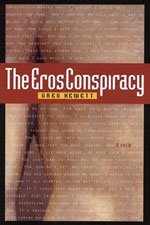

I'm reading a terrific new book of poems, The Eros Conspiracy, by Greg Hewett. It's a book-length sequence (doesn't it seem everybody is doing a book-length sequence these days?). There are no individual poem titles; instead, each poem begins with an italicized phrase that is a bit of language he has overheard "in life or on television," such as: Obviously I wanted you; I thought I could have you; Don't torture me this way. (In addition, these phrases are printed across the book's lovely cover, over the image of a man's naked torso).
The poems inter-twine several disparate themes and times: the history of beauty as seen in old classical art sculptures (mostly of nude boys and men), the beauty of history as seen in the life stories of several historical figures (many of them gay: Hart Crane, Oscar Wilde, Michelangelo, etc), a star-crossed contemporary love affair, the idea of "Revolution" both in the political sense and the artistic sense.
It's a fun read, and can definitely be seen as a single long poem, with the recurring gestures developing a cumulative power over the length of the book. For that reason, it's hard to quote individual poems, because they sometimes don't always stand up as well on their own, but really tend to depend upon each other, and the flow of the wonderful narrative (or argument) that Hewett is developing. Highly recommended. Here's a couple sample poems:
What are you wearing?
Something revolutionary, I hope.
A red bandana around your forehead,
hammer or sickle in hand?
Otherwise completely naked,
posed like some politburo version
of a CK model, without the porn
softened by an engineered erection
hidden in tedious white briefs.
Because I like my revolution raw
and having a replica of David
on the coffee table is so passe,
so declasse, so utterly bourgeois
for one in training to be the guerrilla
embodiment of a dirty old man.
(pg 19)
*
Couldn't we try again
to erect an angular colossus
of Marx on every Platz or hang
an acre of silk with Mao's iconic
countenance purely benevolent?
Couldn't we risk these figures
who shaped the world to their words
by sheer force? Or would we be better,
as you suggest, served by our own
images taken in the intimacy
of an automatic photo booth,
some for hiding in our wallets,
some for securing false identity
for a life of conspiracy,
for a life inspired?
(pg 42)
*
This last poem, I think, captures the essential issue: how to balance the private romantic inner life, with outer public civic/political existence.



No comments:
Post a Comment